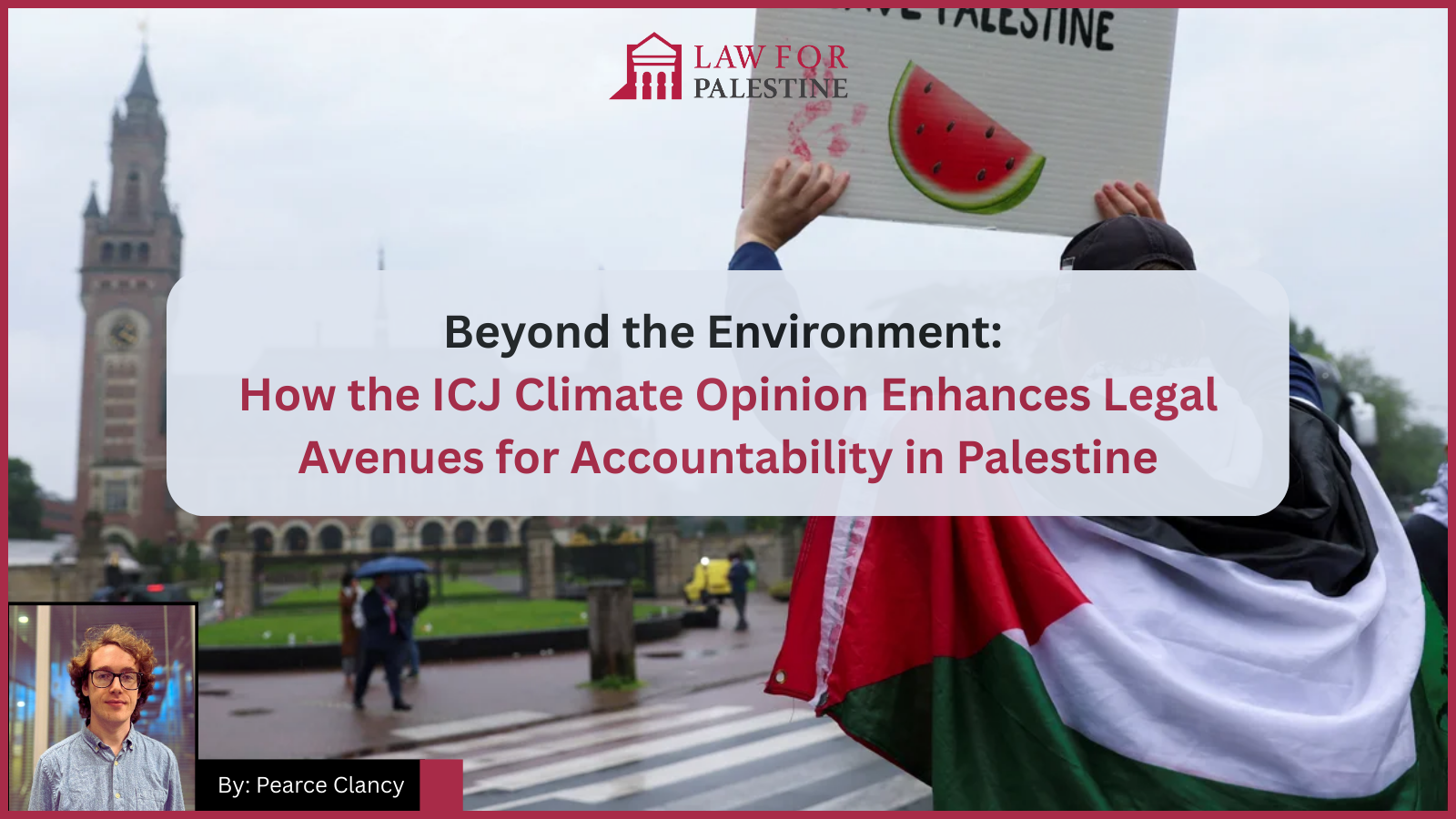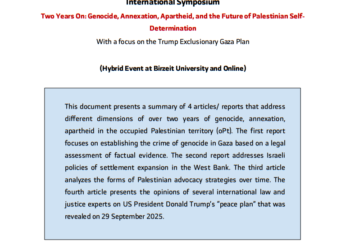Beyond the Environment: How the ICJ Climate Opinion Enhances Legal Avenues for Accountability in Palestine
Author: Pearce Clancy
Postdoctoral Fellow, Law School, Trinity College Dublin. NUI EJ Phelan Fellow in International Law 2022-2024.
On 23 July 2025, the International Court of Justice (ICJ) issued its Advisory Opinion on the Obligations of States in Respect of Climate Change. This Opinion focuses first and foremost on issues of international environmental law and international climate change law. Nonetheless, and beyond the universal threat of climate degradation and collapse, elements of its legal analysis are also of direct interest to Palestine and the ongoing genocide imposed on the Palestinian people. This short piece serves to identify three such elements and explore in brief how they may be used in the pursuit of justice and accountability for Palestine through international law.
Armed Conflict and Climate Change
In its oral submissions to the Court in relation to the Advisory Opinion, the State of Palestine put considerable emphasis on the relationship between armed conflict and environmental degradation, and the protections afforded to the natural environment by international humanitarian law. In doing so, Professor Nilufer Oral, as counsel for the State of Palestine, outlined the applicable international humanitarian law rules providing protection for the environment, as well as issuing a call for the Court to provide:
‘… clear guidance on the application of international humanitarian law to the harmful effects on climate change from armed conflict and other military activities. In particular, we request that the Court clarify that the environment, including carbon sinks and reservoirs, is a civilian object and that the rules of distinction, proportionality and precaution apply to armed conflict and other military activities that generate GHG emissions and contribute to climate change.’
Further, Kate Macintosh, also counsel for the State of Palestine, stressed that there is a serious gap in the reporting of greenhouse gas emissions during armed conflict, including situations of occupation. Israel, for example, does not include its emissions in the Occupied Palestinian Territory, whether from the genocide in Gaza or from the unlawful settlement enterprise, in its emissions reports, nor does it report the destruction of carbon sinks.
Nonetheless, the Court does not engage with the issue of armed conflict. In fact, armed conflict is only addressed in the separate declaration issued by Judge Cleveland. In her declaration, the Judge avers that states are indeed under an obligation ‘to assess, report on and mitigate harms to the climate system … resulting from armed conflict and other military activities.’
The Duty to Prevent (Genocide)
A point of considerable importance in legal discussions regarding the obligations of third states vis-à-vis the genocide in Gaza is the duty to prevent genocide. First addressed by the ICJ in its 2007 judgment in Bosnia v Serbia, the duty to prevent requires states ‘to employ all means reasonably available to them, so as to prevent genocide so far as possible.’ As explained by the Court in 2007, the duty requires states to act with due diligence, with states that are better placed to influence the relevant actors being held to a higher standard.
A comparable duty to prevent similarly exists in international environmental law, articulated more specifically as a ‘duty to prevent significant harm to the environment’. The Court had previously addressed this environmental duty in its judgment in the Pulp Mills case, but had not directly compared it to the duty to prevent genocide. In the recent Advisory Opinion, however, the ICJ directly links the environmental duty to prevent and the duty to prevent genocide. In setting out the nature of due diligence (see para. 132-139), the Court uses its dictum in Bosnia v Serbia to outline the nature of the environmental duty to prevent. This is significant as in Bosnia v Serbia (see para. 429), the ICJ was at pains to stress that it was not developing a general conception of the ‘duty to prevent’ as it appears in all or even some instruments, but only as it applies in the Genocide Convention. The Court’s invoking of the duty to prevent genocide as an indicator of the structure of the environmental duty to prevent, then, suggests that the modalities of one also apply to the other.
Reading down the Opinion (at para. 428), the Court makes an important point regarding the duty to prevent and private actors, such as businesses, located or operating within the territory of a state. The ICJ states that:
‘In relation to private actors, the Court observes that the obligations it has identified under question (a) include the obligation of States to regulate the activities of private actors as a matter of due diligence … Thus, a State may be responsible where, for example, it has failed to exercise due diligence by not taking the necessary regulatory and legislative measures to limit the quantity of emissions caused by private actors under its jurisdiction.’
Beyond the transfer of arms and military material, which generally require state approval by way of export licenses, states may be in further violation of the duty to prevent by, inter alia, allowing their nationals to enlist in the Israeli military and engaging in the Israel Bonds programme
In the context of Gaza, it is thus clear that the duty to prevent genocide necessarily involves an obligation of due diligence to ensure that businesses and other actors do not contribute to the commission of genocide. Beyond the transfer of arms and military material, which generally require state approval by way of export licenses, states may be in further violation of the duty to prevent by, inter alia, allowing their nationals to enlist in the Israeli military, engaging in the Israel Bonds programme, allowing financial institutions based within their territories to provide loans and financial support to Israeli entities engaged in the genocide, etc. The shift in focus from the positive act of approving export licenses to the omission of failing to ‘regulate the activities of private actors as a matter of due diligence’ is a significant one, and one which should be taken note of by third states in their relations with Israel.
Relatedly, although the 1949 Geneva Conventions do not contain the same formulation of a ‘duty to prevent’, Common Article 1 does nonetheless require High Contracting Parties to ‘ensure respect’ for international humanitarian law and take steps to induce other states to act in conformity with that area of law. Applying the due diligence requirements of the duty to prevent to those of the duty to ensure respect, it follows that states must similarly ensure that private actors within their jurisdictions do not contribute to violations of international humanitarian law, including, for example, the provision of construction materials used in the construction and maintenance of Israeli settlements.
Standing for Third Party Litigation before the ICJ
A final point worth noting is that the ICJ in its Advisory Opinion recognises the possibility of states initiating contentious proceedings before the Court on the basis of obligations erga omnes, distinct from obligations erga omnes partes (see para. 441-444; see also Paddeu and Jackson). Previous examples of third-party cases brought by non-injured states—including South Africa v Israel as well as Nicaragua v Germany, the latter concerning German support to Israel during the genocide—have been based on obligations erga omnes partes, which are rooted in multilateral treaties. Such cases cannot be brought against states which have entered reservations against the compromissory clauses of treaties such as the Genocide Convention, however. As such reservations are seemingly here to stay, the possibility of cases being brought on the basis of obligations erga omnes, rooted in customary international law or jus cogens norms, may open further avenues for accountability efforts by third states.
Such cases would nonetheless still need to navigate the ICJ’s jurisdictional regime and could only be brought against states which have accepted the compulsory jurisdiction of the Court. Israel has not, and the United States famously rescinded its acceptance in the 1980s. Nonetheless, several Western states that have accepted the Court’s jurisdiction may, through their continued support for Israel be complicit in the violation of the Palestinian people’s right to self-determination, which the Court, in its July 2024 Advisory Opinion, recognised as a jus cogens norm and an obligation of an erga omnes character. Further, states are free to impose restrictions on the Court’s jurisdiction over them. Notwithstanding these jurisdictional constraints, the Court’s confirmation of erga omnes standing can be used as a basis for further public interest cases before the Court, and the Court’s recognition of the possibility of such cases being brought does arguably point towards the bench’s openness to the Court being used in this way.
Conclusion
As noted at the outset, the intention of this piece is not to be exhaustive of the full legal significance of the Advisory Opinion, but rather to highlight and consider some key components which may be of value to Palestine accountability efforts. The primary value of the Advisory Opinion is of course to be found in its treatment of international law as it applies to climate change, which affects Palestine just as it does the rest of the world. Nonetheless, its contribution to the development of international law more broadly will have an impact on litigation and other legal processes concerning Palestine.







